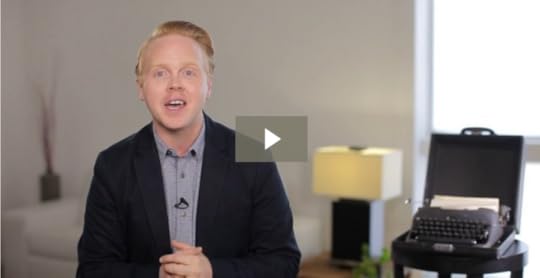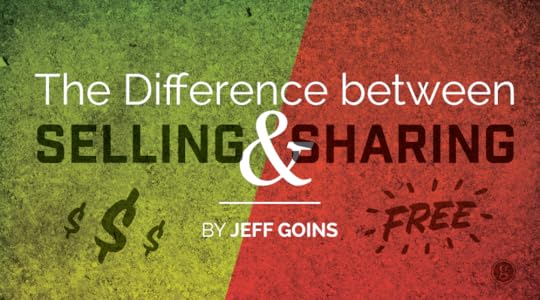Jeff Goins's Blog, page 47
November 15, 2015
Your Writing Will Fail If You Don’t Do This
Nothing stings like failure. I’ve tasted it many times. It’s the worst feeling in the world to fall short of your dreams. Especially when those dreams involve writing.

I hate telling people they’ll fail, but I care too much about you to lie to you. If you want to succeed, you’re going to need one thing that most people neglect in their writing careers. Without it, you’re only setting yourself up for disappointment.
So what is it? Not what you think.
A lot of people today say that passion is what drives success, but that’s not true. You need more than a deep desire to succeed. You need a strategy. That’s one thing that makes everything easier if you have it. And it makes everything harder if you don’t.
This is what one of my Tribe Writers students learned when she finally got tired of not having an audience and decided to build her own. Here’s her story.
How to get a celebrity blogger to notice you
One of the most humbling parts about what I do is seeing students I teach do things I haven’t done. One person who did that in an astounding way is Elizabeth Kelsey.

Elizabeth took my Tribe Writers course last year, and at the end of it, she sent me a message: “Tribe Writers has helped me in so many ways, it has given me the confidence to continue writing and also helped me grow my blog to over 2K subscribers by finding my voice.”
Elizabeth started blogging almost six years ago. She started a small niche site but quickly discovered she wasn’t passionate about the topic she was writing about. So she decided to start a second blog called Savouring Simplicity.
“The blog just felt better from the start,” she told me, “as I was no longer writing exclusively about family travel and had networked with writers who shared similar passions with me, i.e. the importance of family, creative living, and eating a whole foods based diet.”
It grew at “a decent pace but not exactly fast,” she said. “I decided to take the advice you gave in Tribe Writers to guest post more frequently, and it began to grow fast. Tribe Writers talk about connecting with people through having a worldview, and that was crucial for me.”
Then, what Elizabeth told me next blew me away: “Oh, also wanted to let you know: I was on Cameron Diaz’s blog last week!!! Seriously!! Took your advice, pitched them, boom.”
Um, what? Cameron Diaz… the actress?! Yes, that Cameron Diaz.
So how did she do it? How did Elizabeth start guest posting for celebrities and quickly build an email list of 2000 readers? Not by passion. By strategy.
What popular bloggers know that you don’t
Elizabeth used a strategy implemented by some of the biggest bloggers in the world. In fact, it’s a strategy I’ve used since the beginning: guest posting.
Through guest posting, Elizabeth built her list, grew her network, and contributed to blogs of celebrities, such as Cameron Diaz and Carrie Ann Moss (who played Trinity in The Matrix). But the way she did this was crucial to her success.
Elizabeth didn’t just hope to succeed. She set a goal, found a winning strategy, then created a plan to get there. If you want to succeed as a writer, you’re going to have to do the same.
Passion alone doesn’t lead to success. You need to be strategic. Here’s the formula:
“Passion + strategy = success.Tweet thisTweet
Things won’t just happen to you, especially if you want to be a writer. You’re going to have to learn from those who have gone before you and tasted success. Understand their methods and use their strategies.
Trying to do it on your own is just foolish. Learn from the best, mimic what they do, and figure out your own way. You won’t succeed without a strategy. It’s just that simple.
This is why I’m passionate about sharing what I’ve learned as a writer who struggled for years to get noticed. We all need to learn from others and then share what we’ve learned.
That’s what Elizabeth Kelsey did. After learning about guest posting in Tribe Writers, she decided to apply the process and made some big asks. And she ended up getting incredible results, results that surprised even herself.
Unpacking the process
Here’s the lesson: success is not based on personality. It’s based on principles. And these are principles that anyone can apply — whether you’re a novelist, self-help writer, CEO, or pet blogger. All you have to do is what Elizabeth did:
Find a process that already works. Elizabeth signed up for Tribe Writers to learn what she didn’t know and invest in her own growth.
Work the process. She created a list of 10 bloggers she dreamed of guest posting for and just started asking them.
Keep trying until you succeed. Elizabeth kept asking until she found a yes. The crazy part? Nine of the ten people she pitched said yes. And the one dummy? Well, that would be me (don’t worry; I’ve since rectified the situation).
Sometimes, when you’ve told yourself “no” for so long, you just might be surprised by how quickly success can come. But it won’t just happen. You’ll need a strategy — one that you can trust, that others before you have used — and you’ll need tenacity to persevere until you succeed.
If Elizabeth’s story teaches us anything, it’s that if you do the work, you’ll see the results. I believe that. And I hope you do, too. If you’re feeling stuck, chances are what’s missing is a strategy, or perhaps, the right strategy.
I’d love to help you with that. If you want to stop feeling frustrated that nobody’s noticing your work and make it as a full-time writer, then it’s time to figure out what you don’t know. Which is why I want to invite you to a free event tomorrow.
On this live webinar, I’ll answer your questions about writing and share exactly how you can do what Elizabeth did, using guest posting to grow an audience. Don’t miss it!
Join me for a live Q&A tomorrow: Everything You Wanted to Know About Becoming a Full-time Writer.
What’s one writing question you have about writing that I can answer on the upcoming webinar? Share in the comments.

November 13, 2015
3 Reasons You Should Take Ownership of Your Writing Career Today
One of the things that’s bugged me for years is that the world’s best writers don’t always get the attention they deserve. So, I decided to do something about it.
Maybe you’ve noticed this, too. Fair or not, the most popular authors, bloggers, and speakers aren’t always the ones with the most talent or even the best ideas. And if that bothers you, it should.
The people who succeed are those who understand how the system works. And those that don’t sadly miss out. But the good news is we writers have more control over our success than ever before.
For years, I have been a student of online marketing and blogging and what it takes to get your message heard. And I’ve discovered, from observing thousands of case studies and through lots of personal trial and error, a way out of this rat race.
You don’t have to write words and hope they get noticed. Creativity is not a crap shoot. If you know the rules, you can use the system to beat the system.
“Creativity is not a crap shoot. You don’t have to be a starving artist.Tweet thisTweet
No, friend. You don’t have to be a starving artist. You can succeed, if you know the path to get there.
Follow in the footsteps of someone who failed his way to success
For eight years I tried to launch multiple blogs, all of which were dismal failures. And then, shockingly, I discovered a way not to fail.
What ended up happening next surprised me more than anyone else:
I built an email list of over 10,000 people in the first year.
My website attracted over 50,000 people per month.
I wrote two books, replaced both my wife’s income and mine, then tripled it, and we quit our jobs.
How did it all happen? I stopped waiting for a perfect opportunity and took ownership of my own writing career.
“Stop waiting for perfect. Take ownership of your writing career.Tweet thisTweet
Just last night, my wife and I were visiting with a couple from our church, and the husband said, “I’ve wanted to write a book for years. But I keep waiting for the right opportunity and it hasn’t come yet. I think I just need to do it.”
He’s absolutely right. You can’t wait for perfect. You just need to act with the information and opportunity that you have. This is your life we’re talking about here. If you don’t live it, who will?
A proven process: Do the work, see the results
Today, we officially open registration for my popular Tribe Writers course, which has now taught over 4000 students what it takes to become a professional writer. This is a course that will help you accomplish the following:
Identify your true writing voice and start using it in all your communication.
Build a platform through mastering the art of blogging.
Expand your reach and find your 1000 true fans.
Publish your work and start making your first $1000 as a writer.
If you’ve been promising yourself that you’ll get your message out there some day, I want to tell you that today is that day. Whether it’s a book or a blog, you can’t keep waiting. You have to act now.
Here’s why today is the best day to begin your writing career:
Because if you don’t take ownership of this who will?
Because if not now, when?
Because today is literally the best day in the world do it.
Regarding #3, since I’m a fan of people taking action, I want to encourage you to not put this off. In fact, I’m even going to reward you if you sign up for Tribe Writers today.
Join now and claim your fast action bonuses!
I’m giving away a bonus to anyone who buys any package of Tribe Writers today. Here’s what you get:
Student: If you sign up for the standard version of the course before the early bird deadline, you’ll get one free license to my favorite word processor, Scrivener (a $45 value).
Premium: If you sign up for the premium version of the course before the early bird deadline, you’ll get Scrivener, PLUS a ticket to next year’s Tribe Conference (a $400 value). You’re responsible for getting yourself to the conference in Nashville next September, but once you get here, your ticket is on us!
And, of course, those bonuses are in addition to the six bonuses worth $490 we’re already giving away (see all the bonuses listed here).
Honestly, I was nervous about giving so much away. Still am. But I believe in Tribe Writers and in taking action, and I wanted to make this a no-brainer for you.
I hope you don’t wait another minute to become the writer you were meant to be. Take it from someone who’s waited: it’s not worth it. Sign up today, and claim those bonuses before it’s too late!
Join Tribe Writers Now
Note: These bonuses go away on Sunday, Nov. 15 at 11:59 P.M. Pacific time. Don’t miss it! Join 4000 others who have decided to become a professional writer and grab those bonuses today. Get started now.

November 11, 2015
081: Your One True Calling Doesn’t Have to be One Thing: Interview with Emilie Wapnick [Podcast]
If you ask a kid what they want to be when they grow up, you’ll get answers like astronaut, football player, artist, and superhero. As grown ups, we often can’t answer the question with such clarity or conviction.
Bonus: Tomorrow I’m hosting a LIVE webinar on how to escaped my desk job and started writing for a living. Space is limited so claim your spot here.
The unspoken assumption behind the question “What do you want to be when you grow up?” is that the what is just one thing. Once you become a fire fighter, accountant, writer, or plumber, that’s it.
But we know better, don’t we?
Emilie Wapnick coined the term “multipotentialite”. This one word summarizes the idea of The Portfolio Life. We’re more complex and our interests are more varied than a single occupation can contain.
This week on The Portfolio Life, Emilie and I talk about why we should embrace our different gifts, and how creativity is fostered when we are willing to work in different fields.
Listen in as we discuss how mastering a craft and being a multipotentialite are not mutually exclusive, and the three essential ingredients to achieve fulfilling variety in your career and life.
Listen to the podcast
To listen to the show, click the player below (If you are reading this via email, please click here).
Your calling is not one thing
A commonly accepted objective of college is to help you figure out what you want to do for the rest of your life, and prepare you for an occupation in a given field.
That’s a lot of pressure (and debt) to place on the shoulders of someone who can’t even rent a car on their own.
Perhaps the root problem lies in the question itself. Instead of asking yourself what you want to be, first define who you want to be.
I’m a writer, but that’s not all I am. I’m also a marketer, speaker, entrepreneur, consultant, and coffee snob.
After I quit a day job to become a full-time writer, I assumed that meant writing for 8 hours a day. What I quickly discovered was not only did I not enjoy writing all day, but trying to write that much didn’t lead to quality content.
When I focused on just one thing I wasn’t doing my best work.
It turns out, we’re not designed for a solitary function. We want to do other things. To explore and experiment with new interests. And it is those other things that actually work together to make all of the work better.
Show highlights
In this episode, Emilie and I discuss:
The origin of “multipotentialite”
Finding a middle ground between single-minded mastery and jack-of-all trades
How task switching leads to invigorating your work
Wrestling with questions of commitment and calling
The value of shape-shifting and evolving interests
Why taking an intentional break can boost productivity and creativity
Rejecting the romantic notion of destiny
What it looks like to make a living as a multipotentialite
Albert Einstein’s secret to creative time freedom
How the difference between quitting and growth boils down to mindset
Where discipline fits into a multipotentialite lifestyle
Practical steps to embrace your various interests
Four models to incorporate multipotentialite values into your work
Quotes and Takeaways
”Multipotentialites don’t quit when things get hard. They quit when things become too easy.” —Emilie Wapnick
”To think that we can each only be great at one thing is really undervaluing what humans are capable of.” —Emilie Wapnick
”Flipping mediums completely enhances your other work.” —Emilie Wapnick
”Once I no longer feel inspired in a field, I simply move on.” —Emilie Wapnick
”Your one true calling is to not have a one true calling.” —Emilie Wapnick
Not all hours are equal.
Projects are a space for you to escape.
Set aside some tinkering time.
Don’t go back to school because you don’t know what else to do.
Resources
Puttylike
Why Some of Us Don’t Have One True Calling (Emilie’s TEDxBend presentation)
Bonus: Tomorrow I’m hosting a LIVE webinar on how to escaped my desk job and started writing for a living. Space is limited so claim your spot here.
Are you a multipotentalite? Which of the four models describe how you approach your work? Share in the comments

November 9, 2015
What I Learned (the Hard Way) About Becoming a Full-time Writer
I used to think becoming a writer was just about writing a lot and waiting for your big break. It’s not.

It’s probably not a coincidence that Entrepreneur decided to run my article about networks and creative work today. I don’t believe in coincidences — at least, not when writing is concerned.
If you want to get your writing noticed, if you want the world to hear your message, you can’t just sit in a cabin and write all day. There’s more to mastering your craft than that. You have to put yourself, and your work, out there.
For the past week, I’ve been teaching a free series on how to build an online audience, distilling all the lessons I’ve learned from building an audience and going pro with my writing. It’s been fun, but one thing I’ve noticed when you talk about your successes is that people like to invent myths about you.
“You just came out of nowhere!” is something people occasionally say to me. They mean it as a compliment, but I always have to set the record straight.
Bonus: In video #3 of my new teaching series, I give you the exact plan I used to build an audience of 100,000 people in 18 months. Get it here.
I’m not an overnight success
I once heard Steve Pressfield share a lesson about the much sought-after “overnight success” we all dream of, and it immediately resonated. Here’s the story in Steve’s own words:
There’s a story about the Oscar-winning actor Walter Matthau. A younger thespian is bemoaning his own struggle in show biz. “Mr. Matthau, I’m just looking for that one big break!”
In the story Matthau laughs. “Kid,” he says. “It’s not the one big break. It’s the fifty big breaks.”
There are no big breaks, only tiny drips of effort that lead to waves of momentum.
I was able to build an audience of 100,000 people in 18 months because I had spent eight years failing at it. When I learned all the ways to not do it, I finally figured out one way that worked. That’s how you succeed: you fail so many times that you run out of options and the only thing left is success.
But let’s be clear about one thing: Luck is proportionate to your frequency of attempts. It increases with the amount of work you put in.
“There are no big breaks, only tiny drips of effort that lead to waves of momentum.Tweet thisTweet
How I built an audience
In a nutshell, here’s what I did (and what I recommend you do to bring attention to your message):
Focus on voice, not subject. People pay attention to you for how you communicate, not just what you say. This is your “one thing” that makes all other efforts inconsequential. When you hone your voice, you’ll have more flexibility as your interests and style change over time.
Build a platform. This is essential. To paraphrase my friend Michael Hyatt, who literally wrote the book on the subject, you can’t get heard today in this noisy world without building a platform. And forget what you’ve heard. You actually can do this your way.
Be helpful. This is the secret to expanding your reach — focus on others, not yourself. Write a free eBook. Network with people in your field by doing favors for them. Serve your way into influence. It works.
Create something so valuable people will want to pay you for it. This is the final step in the process and must be done last if you want it to be successful. For some, this will be the book you’ve dreamed of writing. For others, it’ll be speaking or an online course. But if you do steps 1-3 well, you will have a line of people waiting to pay you. It’s not a matter of making them, but rather letting them. Value gets its reward.
To learn more about how I did this and have helped thousands of others follow the same process, watch today’s free video (only available for a limited time).
Don’t miss the free series
In this free video, I share the four-step process I used to build my audience but also share a case study of how one author used it quit her job and start writing novels full-time. In it, you’ll learn:
Why waiting for a big break is just about the worst thing you can do.
How to build a platform that gets you noticed, without having to change who you are.
The exact plan I used to pro and have helped thousands of other writers used to accomplish their goals.
Ready to go pro with your writing? Watch today’s third and final video to find out. Be sure to leave a comment on that page, sharing what you’ve learned from this free video series so far!

November 6, 2015
Building an Audience: Why You Don’t Have to Do It “Their” Way [Podcast]
One of the questions I get every single week, usually from writers, is this: Do I really need a platform? And the answer to that is yes. But not in the way you think.
The fear, I think, that many of us struggle with is that in building a “platform,” a place where you can showcase your best work and bring attention to it, that you’re somehow crossing a line, selling out. But that’s just not true.
A platform is people — nothing more, nothing less. It’s how you connect your message to the needs of the world. And if you have something to say or share, it’s essential.
Here’s the thing, though: You don’t have to do this the same way everyone else does. You can build a platform your way. In fact, it’s supremely important that you don’t chase other people’s success or try to give people what you think they want.
Bonus: In video #2 of my new teaching series on how to build an audience, I explain why “You Don’t Have to Do it Their Way.” Check it out here.
You need to find your authentic voice and build an audience around your unique message. Otherwise, you’re simply a hack, pandering to the whims of the masses. And trust me, I’ve done that. It doesn’t work out too well.
How I failed before succeeding
Years ago, I started blogging and did whatever I could to try to get people to read it. I’d change topics, chase trends, swap links with anybody. Whatever I needed to do to get attention, I would do it.
And sometimes, people did notice. The problem, though, was when they did, their attention exposed the fact that I was a fake. I wasn’t getting accolades for who I was. I was playing the celebrity, getting applause for playing a part, trying to be who they wanted me to be.
Let me tell you. It’s no fun winning people’s affection for something you didn’t earn or didn’t want. The worst kind of failure is succeeding at the wrong thing.
“The worst kind of failure is succeeding at the wrong thing.Tweet thisTweet
Focus on what makes you different, what makes you unique. Be your true self. This is a cliche for a reason. The last thing you want is to showcase to the world a shadow of the real thing.
What happens when we embrace our authentic message
Here’s what happens when you do this, when you start doing more authentic work the way you were meant to do it:
You do better work. When you’re doing work that inspires you, that excites you, you bring an unmatched energy and enthusiasm to that, which ultimately results in higher quality work.
You do more interesting work. It’s one thing to be good. It’s another to do work that is intriguing and captivating, something worth talking about. When you embrace your authentic self and share your message with the world, it is often something people want to talk about.
You attract more of the right kind of people. Trying to reach a mass market is a fool’s errand. The Internet has fractured society into a million tiny niches and markets. The best thing you can do is place your stake in the ground and let people see it. Those who agree with you, and there are always some, will flock to you and follow you for your courage and tenacity. Nobody wants to be pandered to, and you don’t need that many people to make a difference.
The world needs fewer fakers and more people being true to themselves. Maybe that can start with you.
And if you want to learn more about how to find your message and share it, check out my latest video series on building an online audience.
In today’s free video, I share the five basic types of platform personalities that most of the world’s most successful bloggers and communicators have used to get their message out there. In it, you’ll learn:
Why some bloggers can just write about their lives and people will care.
How certain writers get away with not having to do any research.
Which platform type best suits your personality and communication style.
Not sure which platform personality you are? Watch the video to find out. Click here to check it out.
Listen to the audio
To listen to the show, click the player below (If you are reading this via email, please click here)

Building an Audience: Why You Don’t Have to Do It “Their” Way
One of the questions I get every single week, usually from writers, is this: Do I really need a platform? And the answer to that is yes. But not in the way you think.
The fear, I think, that many of us struggle with is that in building a “platform,” a place where you can showcase your best work and bring attention to it, that you’re somehow crossing a line, selling out. But that’s just not true.
A platform is people — nothing more, nothing less. It’s how you connect your message to the needs of the world. And if you have something to say or share, it’s essential.
Here’s the thing, though: You don’t have to do this the same way everyone else does. You can build a platform your way. In fact, it’s supremely important that you don’t chase other people’s success or try to give people what you think they want.
Bonus: In video #2 of my new teaching series on how to build an audience, I explain why “You Don’t Have to Do it Their Way.” Check it out here.
You need to find your authentic voice and build an audience around your unique message. Otherwise, you’re simply a hack, pandering to the whims of the masses. And trust me, I’ve done that. It doesn’t work out too well.
How I failed before succeeding
Years ago, I started blogging and did whatever I could to try to get people to read it. I’d change topics, chase trends, swap links with anybody. Whatever I needed to do to get attention, I would do it.
And sometimes, people did notice. The problem, though, was when they did, their attention exposed the fact that I was a fake. I wasn’t getting accolades for who I was. I was playing the celebrity, getting applause for playing a part, trying to be who they wanted me to be.
Let me tell you. It’s no fun winning people’s affection for something you didn’t earn or didn’t want. The worst kind of failure is succeeding at the wrong thing.
“The worst kind of failure is succeeding at the wrong thing.Tweet thisTweet
Focus on what makes you different, what makes you unique. Be your true self. This is a cliche for a reason. The last thing you want is to showcase to the world a shadow of the real thing.
What happens when we embrace our authentic message
Here’s what happens when you do this, when you start doing more authentic work the way you were meant to do it:
You do better work. When you’re doing work that inspires you, that excites you, you bring an unmatched energy and enthusiasm to that, which ultimately results in higher quality work.
You do more interesting work. It’s one thing to be good. It’s another to do work that is intriguing and captivating, something worth talking about. When you embrace your authentic self and share your message with the world, it is often something people want to talk about.
You attract more of the right kind of people. Trying to reach a mass market is a fool’s errand. The Internet has fractured society into a million tiny niches and markets. The best thing you can do is place your stake in the ground and let people see it. Those who agree with you, and there are always some, will flock to you and follow you for your courage and tenacity. Nobody wants to be pandered to, and you don’t need that many people to make a difference.
The world needs fewer fakers and more people being true to themselves. Maybe that can start with you.
And if you want to learn more about how to find your message and share it, check out my latest video series on building an online audience.
In today’s free video, I share the five basic types of platform personalities that most of the world’s most successful bloggers and communicators have used to get their message out there. In it, you’ll learn:
Why some bloggers can just write about their lives and people will care.
How certain writers get away with not having to do any research.
Which platform type best suits your personality and communication style.
Not sure which platform personality you are? Watch the video to find out. Click here to check it out.

November 4, 2015
080: Finding Your One Thing: Interview with Jay Papasan [Podcast]
The quickest way to tell the difference between a writer and someone who wants to write, is the one who actually writes.
Creatives of all shades struggle with the tension between their passion and the hard work of honing their craft. It’s far easier to complain about writer’s block or say you are too busy.
The inconvenient truth of creative work is that it requires work. Jay Papasan, co-author of The One Thing, shares that many professional writers got their start by waking up early to write while their family was still asleep.
This week on The Portfolio Life, Jay and I talk about how long habits really take to form and why self-discipline is a myth that sets us up for failure.
Listen in as we discuss unconventional paths to becoming a writer, and why you need to pay attention to the elephant in the room.
Listen to the podcast
To listen to the show, click the player below (If you are reading this via email, please click here).
The domino principle
People often ask questions like, “How do I write a book?” or “How can I write better blog posts?” or “How did you learn to write like you do?”
One domino at a time.
If you’ve ever tried to setup a string of dominos you know a gentle bump quickly sends the whole display toppling over. The same principle applies to writing or any craft for that matter.
Each domino is a day you show up, put your butt in the chair, and write. As each day passes the dominos tip over more easily and begin to build momentum. Your writing becomes more confident as you experience less resistance. This confidence leads to competent work and your craft improves.
If you miss too many days in a row the momentum halts, and it is difficult to start over. At these points you must get the dominos tipping again.
I struggle with this as a writer. I much prefer hitting publish so my calendar is blocked off the same time every day for dedicated writing.
The more consecutive days I’ve written, the easier the next day gets. As I sit down at the same desk, at the same time, with my coffee and blank page, the words flow more freely each day.
You can overcome the creative hurdles in your path by focusing on the single domino today.
To get through the hardest journey, we need take only one step at a time, but we must keep on stepping. —Chinese proverb
Show highlights
In this episode, Jay and I discuss:
How to do less and get more
A common characteristic of great writers
Dealing with a lack of clarity
A simple formula for becoming a writer
What your heart and an African elephant have in common
Wrestling with shame when you fall off the creative wagon
How the domino principle reveals your true potential
Finding joy in writing and sharing it
Why mastery is not an event
Three commitments to your one thing
The development cycle of lasting habits
What is flawed about the idea of self-discipline
Quotes and Takeaways
“If you really want to get more out of your life, you need to focus on less.” —Jay Papasan
Love the simplicity of writing and reading a little bit each day.
“Zero in on what matters most and give that one thing your best effort.” —Jay Papasan
An author has an audience.
“Who you are and what you do should be the same.” —Wendy Papasan
Your elephant is in charge whether you realize it or not. Look for clues to see where it’s leading you.
“Stop and ask the question or you won’t get the answer.” —Jay Papasan
Whatever you’re doing, you need to be all in and all there to do the best you can.
Resources
The One Thing by Gary Keller & Jay Papasan
Essentialism by Greg McKeown
The Millionaire Real Estate Agent by Gary Keller, Dave Jenks, & Jay Papasan
The Happiness Hypothesis by Jonathan Haidt
Let Your Life Speak by Parker Palmer
The Greatest Salesman in the World by Og Mandino
Clarity Podcasting
Bonus: This week I’m teaching a free video series on how to build a tribe once you’ve found your one thing. Watch the first video here.
What ONE thing do you need to focus on in this season? How are you owning the outcome of your work? Share in the comments

November 3, 2015
Small Is the New Big: Building Community in an Age of Internet Fame
So many people seem to want to be famous these days. Writers. Artists. Communicators. You name it. Everyone is trying to make a name for themselves. But is being a big deal all it’s cracked up to be?

I have a very wealthy friend who used to be a struggling musician, and he likes to say, “I became successful when I stopped trying to be famous.” I like that. Fame is not the means to success we think it is.
But let’s put this into the buzz words of today. Say you want more “influence.” You want to make an impact. Right?
So how would you go about doing that? If you’re like a lot of people, you’d go for the masses. You’d try to get in front of people, interrupt them, get them to notice you. But how would you do that? You’d need lots of people. Right? Bigger means better, yes?
Not necessarily.
Bonus: In video #1 of my new teaching series on how to build a tribe, I explain why “Small Is the New Big.” Check it out here.
My disappointing love affair with fame
For seven years, I chased the empty promises of fame and was continually disappointed with what I found (or more often, didn’t find).
I started blogs and quit because nobody cared. I began writing books that I never finished, because who would read them? I tried to become a social media celebrity only to hear the sound of crickets.
When I eventually did get a little recognition, I realized I had built an audience around other people’s expectations, something I couldn’t sustain. Fame had let me down. What was I doing wrong?
Just at the brink of giving up and wondering if I really had anything to say at all, I started over. I began to treat people as individuals and not numbers. And slowly but surely, I built an authentic community.
What I discovered from the process surprised me: It’s better to have 1000 true fans than 1 million lackluster followers.
“It’s better to have 1000 true fans than 1 million lackluster followers.Tweet thisTweet
But how do you get started? Most people, especially ambitious people who feel like they have something to say, despise small beginnings. But most of us start with very little.
So if you have something to say or share, what does your start look like? It might be smaller than you think.
Where it starts
1000 true fans starts with 10 true friends.
Honor the influence that you already have. Be grateful for the attention you’ve earned, however little it may be. Thank the three followers and two fans and six page views. Because it’s harder to go from 0 to 10 than it is to go from 10 to 10,000. Remember that.
Sure, many of us want more influence and more applause and for our messages to be heard. But who is already listening to you? How can you appreciate them? I guarantee you that’s the key to more of the influence you seek.
Of course, this is not fame. Fame is something different. Fame is people worshiping you for who they want you to be, but not who you really are. And fame is often a trap that leads to disappointing both the performer and the audience.
My advice: find your 1000 true fans. And start with 10 true friends. Begin with what you have, and if you are faithful enough, it will be multiplied.
I share more about this in the first video of my three-part series, How to Build a Tribe without Selling Out, so be sure to go watch it, then tell me what you think. Click below to check it out.
Watch My New Video Now

November 2, 2015
The Difference Between Selling and Sharing
There’s a difference, you know:
Between hawking a product at an disinterested group and telling your friends about a movie they can’t miss.
Between spamming everyone you know and passionately proclaiming good news you can’t keep inside.
Between manipulating people to buy something and just simply sharing something you’ve created.
But some never understand this. Some people think that if you have anything to sell, ever, then you’re instantly a fake, a charlatan, a scammer. And these people will never be satisfied. They will always criticize and find reasons to tell you what you’re doing is wrong.
And you should ignore them.
Don’t be afraid
Someone recently asked me:
Do creative people have trouble getting paid for their work?
Indeed, they do. In fact, I believe this applies to anyone with remarkable skills they take for granted. Many gifted people don’t understand the value of their gifts. They minimize them, dismiss them, and sabotage their work.
But why?
Because, they reason, why should I get paid for something I enjoy? It’s easy. Fun. Effortless. But not for everyone. Just for you. Which only makes what you do even more valuable.
Here’s a challenge: Stop apologizing for your art, and embrace the fact you have something valuable to share. Something that’s — dare I say it? — worth money.
Charge for your best work
Recently, our friend Lisa delivered a kitchen table she refinished for us. This was an old, worn table riddled with stains and water marks. We didn’t have high expectations for what could be done with it.
When we saw our friend’s finished work, we didn’t even recognize the table. It was amazing. My wife just kept saying “thank you.”
After we asked her what we owed her, Lisa said, “I hate charging friends…” But then she told us the price and we gladly paid it.
Why do we do this? Why do we hate charging people to do our best work? I think it’s time we stop apologizing and start valuing the contributions we can make.
How to not sell out
This isn’t license to sell out and turn every word you write, every photo you take, and every picture you paint into a paid product. No. That’s not the point at all. The point is this:
Now, you can be your own patron.
In an age when artists don’t have to be at the bottom of the food chain, dependent on the generosity of others, the only thing holding creative people back from success is themselves.
“The only thing holding creative people back from success is themselves.Tweet thisTweet
Don’t mistake me here. If you don’t want to make money off your art, don’t do it. Nobody’s forcing you to do it. But don’t use lack of resources as an excuse to not create, because you no longer have that excuse.
The world values your work. The question is, do you?
If you struggle with this, you’re not alone. I’ve been there before, too, which is why I’m so passionate about getting people to value their creative work. In fact, I’m doing something special this week just for you.
I’m teaching a free training series to help you find your 1000 true fans and get paid to share your message. This includes three, pre-recorded videos plus live Q&A events throughout the week. I’ll share how I grew an audience of 100,000 people in 18 months, what I learned, and how you can start building your own tribe.
The series begins tomorrow, but you can join me on Blab today at 1:30p CT today, where I’ll be talking with Kevin Kaiser, a long-time creative advisor who has helped best-selling writers get out of their own way and reach tens of millions worldwide.
Sign Up for Free Here
What’s a gift you’re undervaluing that you should be sharing with the world? Share in the comments.

October 30, 2015
How a Vacation to Italy Reminded Me of My Purpose
My wife sank deep into her seat as the train rocked her to sleep. I flipped through a few pages of a book I just couldn’t get into and glanced out the window, watching the Tuscan countryside roll by. This was it, the trip we had been waiting for.
I had waited 10 years to share this experience with Ashley, and over the past year we had budgeted and saved and planned just to make it happen. Now, it was here.
Opening my laptop, I pecked away at the keyboard, then glanced again out the window, hoping to spot a vineyard or something. As I took in the view, in between mountain passes that blacked out the cabin, I felt a sense of rightness in my soul.
The trip was full of moments like that, moments of surrender and revelation.

Photo taken in Florence, Italy.
In Rome, we walked the same streets St. Paul strolled, taking pictures at sunset of the Colosseum and imagining what life must have been like for those living there two thousand years ago. We ate margherita pizza by the Pantheon, and I consumed more cappuccino than is probably safe for a human being to do in a single day. Oh well, I thought. You only get to Italy but once in a decade. Or at least, that was how long it had been for me.

Cappuccino in Rome. My third of five that day.
In Florence, we ate chocolate and hazelnut gelato on the historic Ponte Vecchio and haggled with merchants at the San Lorenzo market, buying souvenirs and Christmas gifts for family. At the historic Nerbone sandwich shop, I ate cow stomach and Ashley settled for porchetta and pasta. I showed her everything I could remember from visiting these places in college.

The view from our hotel in Florence.
Every day, we exhausted ourselves with hours of walking and shopping and eating, enjoying eight days of travel and togetherness while the in-laws watched our son three thousand miles away. We held hands and laughed and talked about how much we missed our boy. It was an important respite after such a hectic season.
But it wasn’t until Venice when it all clicked for me. We bought a 48-hour water bus ticket to navigate the city on the sea, and at some point while crossing a cobblestone bridge over one of the innumerable canals, my wife said something to me that changed everything.

Sunset in Venice.
It was a simple word, one that made me realize why I wanted this trip in the first place. In fact, it made me realize why I do what I do at all, what keeps me going in my career as a writer.
“Thanks.”
One simple word. Six unextroardinary letters. That was all it took to make the whole trip worth the time and money spent to get there. Just a simple word of appreciation.
It’s not that my wife doesn’t show her appreciation. She does. In fact, she probably tells me she’s grateful for the life we get to live every day. But I needed to hear that one word as a reminder to me of what this, all this blogging and book writing and online teaching, is for. It’s not for me.
It’s easy for me to get stuck in a rut and let my priorities fall out of order, to believe I live to work instead of the other way around. It’s tempting to get caught up in endless pursuits of celebrity and fame and trying to impress people. But none of those things satisfy. Because even when you do what you love, when you’re living your calling, you can’t forget that there’s always a greater why behind what you do.
There has to be a life behind the work, something that’s bigger than you, a cause to guide you. And as we strolled the dimly-lit sidewalks of Italy, hand in hand with our hearts and stomachs full, I remembered mine.
Without that purpose, the words we write and work we do doesn’t much matter. If it’s time to rediscover your purpose, I want to encourage you to to step out of your normal routine. It doesn’t have to be a trip to Italy, either. You could start by joining me for a free class I’m teaching next week.

My bride and me in Venice. Rialto bridge behind us.
Bonus: I’m teaching a free training series to help you find your 1000 true fans and get paid to share your message. I’ll share how I grew an audience of 100,000 people in 18 months and what I learned. Sign up for free here.
What’s the why behind what you do? Share in the comments.












